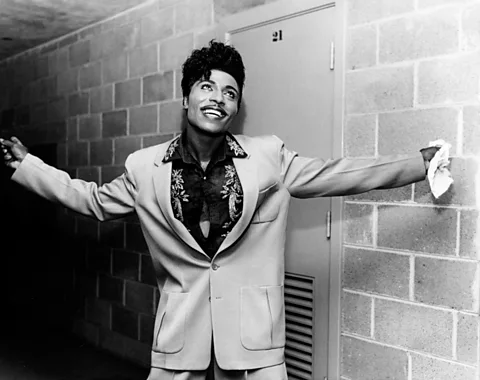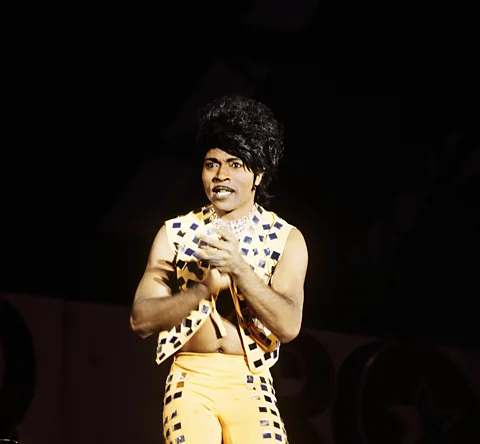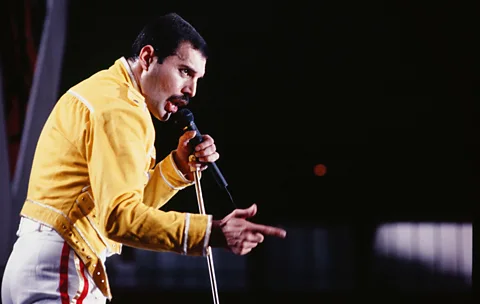'Awop-bop-aloobop alop-bam-boom!': Why Little Richard's hit song Tutti Frutti was so risqué
 Alamy
AlamyWhen the single was released on 20 October 1955, it was a big hit – but only after the original lyrics were changed. In 1972, the singer told the BBC that "there's nothing bad" about his music.
Awop-bop-aloobop alop-bam-boom! With a wild outburst of glorious nonsense, Little Richard announced himself to the world. Was he using his voice to mimic the sound of a drum break or did those strange syllables have a deeper secret meaning? Whatever, Tutti Frutti became an instant classic when it was released 70 years ago, on 20 October 1955, and the world's teenagers made him a star. Bawling like a man possessed, the self-proclaimed Georgia Peach was top of the pops for a few short years with a string of hits such as Lucille, Good Golly Miss Molly and Long Tall Sally.
But by the end of the decade, his glory days were over. He decided he was guilty of playing the devil's music and went back home to Georgia to sing the gospel. The irrepressible rocker did try to mount several pop comebacks over the years, but the initial momentum was gone. However, his megawatt star quality remained undimmed.
By 1972, at the ripe old age of 39, Richard was back on the comeback trail in London; as one of the first generation of rockers to enter middle age, he was now considered a golden oldie. He was in town to co-headline, with Chuck Berry, a summer Wembley Stadium gig billed as The London Rock and Roll Show.
In a BBC interview to promote the concert, Richard hollered: "Let it all hang out with the beautiful Little Richard from down in Macon, Georgia. I am the king of rock'n'roll!" Presenter Ray Connolly, with classic understatement, asked him: "Were you always so shy?" For a first-time television interviewer, this was a baptism of fire.
Born Richard Penniman in 1932 – "I have six brothers and five sisters, but I was the best looking one of all of them and I'm not conceited at all" – Richard said he grew up singing in his preacher grandfather's church. "I used to play Tutti Frutti and Long Tall Sally while he'd be preaching." In the 1950s, racial segregation in the US meant that there were limited opportunities for black performers. Richard found a secular safe place to develop his raw talent on the Chitlin' Circuit, a network of live venues established by black entertainers and entrepreneurs mainly in the Deep South. These were the venues where the sound of rock'n'roll was born.
In History
In History is a series which uses the BBC's unique audio and video archive to explore historical events that still resonate today. Sign up to the accompanying weekly newsletter.
Eager to escape his job as a dishwasher at the Greyhound bus station in Macon – "I had been washing plates for so long, I was tired" – he sent his demo tape to Los Angeles-based label Specialty Records. In archive featured in the 2023 BBC documentary, Arena: The King and Queen of Rock'n'Roll, label founder Art Rupe recalled: "We didn't listen to the tape right away. It was a scratchy tape and it was poorly recorded. He just kept calling us, so finally I said, 'Find that tape,' and we found it and we listened to it. If it hadn't been for Richard's persistence, we would have never met Little Richard."
 Getty Images
Getty ImagesEarly recording sessions in New Orleans failed to capture the magic. Producer Robert "Bumps" Blackwell said he didn't appreciate Richard until he saw him play at the city's famous Dew Drop Inn. He said: "That was when I begin to know and understand Richard, because all you've got to do is give Richard an audience, turn the lights on, and the show is on." Richard's bandmate and friend Ron Jones recalled in the Arena documentary: "He jumped on the piano and sang, 'Awop-bop-a loo bop alop-bam-boom!' So they heard it and said, 'Wait a minute, what's that?' It was a hook that they had never heard before, but Richard had been singing that phrase for years on the Chitlin' Circuit."
Richard's influence spanned generations and genres
But if Tutti Frutti was going to be a hit record, its risqué lyrics needed a major rewrite. Deacon John, former band leader at the Dew Drop Inn, told Arena: "The lyrics could be interpreted as gay sex. They're not going to play that on the radio!... And everybody knew, this ain't about ice cream! But the primary reaction from the producer's point of view was, 'Hey, this sounds like a hit record.'" Producer "Bumps" Blackwell said: "I asked him did he have a grudge against making money? He said, 'No.' I said, 'Good.' So we wrote the words,'Tutti frutti, oh rooty,' and a girl named Sue and a girl named Daisy, put Richard on the piano, and in 15 minutes I think we cut two or three cuts, and it's been history ever since."
The recording may have been unbeatable, but in the US it wasn't the biggest hit version. The man who introduced the delights of Tutti Frutti to the mainstream was Pat Boone, a squeaky-clean square who specialised in taming rock'n'roll for a mostly white audience. If he had known about the original lyrics at the time, he probably would have been appalled. Boone told Arena: "What I wanted to sing were songs about love and happiness and all that. That was what they played on the radio back then. Rhythm and blues music was called race music. Here I am, a church-going white kid from Nashville. I knew very little of it. But then when I heard a song by Little Richard called Tutti Frutti, I just flat-out loved it and so I thought, 'I'm going to do my version of it.'" It sold one million records.
More like this:
• Nina Simone on how racial injustice fuelled her songs
Boone rejects any accusations of cultural appropriation. "Some people, if they didn't live through the era, think that we were taking something from those black performers. No, we weren't. We were introducing him to a much bigger audience. I've said many times, I think I and Elvis were midwives at the birth of rock'n'roll." Little Richard himself said he wasn't bothered that Boone's version sold more than his did. He told the BBC: "It made me feel good. They opened a door that was locked and I couldn't get in."
 Alamy
AlamyRichard may have burst through the locked door, but his exit in the late 1950s was equally dramatic. In his autobiography, he claimed that during a turbulent flight from Melbourne to Sydney, he saw the plane's red-hot engines and felt that angels were holding it up. After his Sydney show, he saw a bright red fireball in the sky. This was later identified as the Russian satellite Sputnik 1, but Richard took it as a sign from God to abandon secular music and repent.
Though openly gay for many years, he also had relationships with women. In 1959, he married fellow Evangelical Ernestine Harvin and later adopted a son. When Richard was re-baptised as a Seventh Day Adventist, he renounced homosexuality, framing it as a temporary choice he had made.
Within five years of quitting rock'n'roll, he was back on the road and touring. The Beatles and the Rolling Stones were among the young acts who played on the same bills with him in Europe, watching him night after night as he delivered a masterclass in stagecraft. Beatles drummer Ringo Starr told Arena that he was a huge influence, while Rolling Stones guitarist Keith Richards admitted: "Mick [Jagger] and I used to try and find our way up into the rafters of the theatres and just watch itfrom above and see how he operated. It was an insight to how hard you might have to work if you wanted to do this stuff."
Richard's influence spanned generations and genres; artists such as Bob Dylan, James Brown, Otis Redding and David Bowie cited him as an inspiration, while a young Jimi Hendrix was once a guitarist in his band. When Queen played at Wembley Stadium in 1986, a year after their Live Aid triumph, one of the songs on the setlist was Tutti Frutti.
A song of love and joy
But what did Richard really mean by his shriek of "awop-bop-aloobop alop-bam-boom"? Well, he claimed to Rolling Stone in 1970 that he came up with it as a sneaky way of cursing at his boss at the dreaded bus station. "He would bring all these pots back for me to wash, and one day I said, 'I've got to do something to stop this man bringing back all these pots to me to wash. And I said, 'Awop-bop-aloobop alop-bam-boom, take 'em out!' and that's what I meant at the time. So I wrote Tutti Frutti in the kitchen, I wrote Good Golly Miss Molly in the kitchen, I wrote Long Tall Sally in that kitchen."
Richard may have moved away from gospel music at the time of his 1972 BBC interview, but he remained a true believer in the power of rock'n'roll. He said: "I consider my music sacred, and I consider Long Tall Sally sacred. I don't mean that it's a hymn like an anthem in church, but there's nothing bad about it. It's a song of love and joy. In a world of chaos and commotion and strife, we need a little joy."
--
For more stories and never-before-published radio scripts to your inbox, sign up to the In History newsletter, while The Essential List delivers a handpicked selection of features and insights twice a week.
For more Culture stories from the BBC, follow us on Facebook and Instagram.
